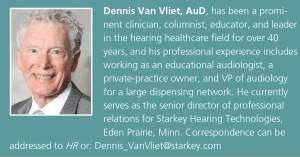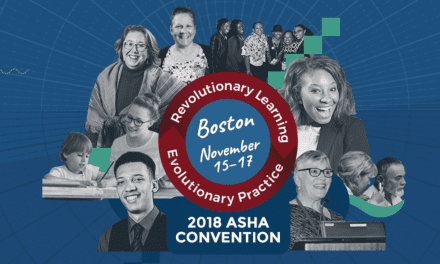Final Word | November 2017 Hearing Review
To the team writing the regulations governing how the over-the-counter (OTC) hearing device regulations will be drafted:
OK team! Now that the political hay has been harvested, the real business of affordable and accessible hearing care is on the table and at your mercy. I understand that much of the input to the drafting of the Warren-Grassley bill, including precursor recommendations from the President’s Council of Advisors on Science and Technology (PCAST), came from individuals well-informed on policy and technology other than hearing aid-specific technology. I know that there was time for input from experts who do know hearing aids, including at the National Academies of Science, Engineering, and Medicine (NASEM) workshops. I’m sure there were impassioned pleas, emails, and letters. I imagine that there was quite a bit of variety in the input (including from industries and the professional societies), which was probably the reason you ignored it for the most part.
Technology alone won’t do much for many of the people out there who have trouble with hearing. Technological advances have helped make hearing aids smaller, more efficient, and more comfortable. But some basic issues remain that OTC won’t necessarily remedy. You have a very difficult task ahead of you to try and bring, through federal law and regulations, the promise of “Affordable and Accessible” home to the people who really need it.
I’m going to try and make this easy for you with a comparison. Let’s think of hearing aids as drugs—the legal, good kind of drugs that treat disease and relieve symptoms. Some drugs need medical supervision to keep people from harming themselves, and some are OTC. Medical supervision is necessary to keep people from harming themselves with drugs like opioids. Well, opioids are a bad example since drug overdoses, many from opioids, killed more people in the US in 2016 than either automobile crashes or gun deaths. Let’s talk about aspirin instead. Aspirin doesn’t require a prescription, and is sold OTC. It has been around for more than 100 years, and commonly used since Felix Hoffmann at Bayer came up with the acetylsalicylic acid in the 1890s, which causes far less of the gastrointestinal distress and bleeding side effects than the raw salicylic acid. Aspirin has other side effects as well. Excessive dosages may cause temporary or permanent hearing loss and tinnitus. It also interferes with blood clotting, which can be bad or good, depending on what you need. Some claim that aspirin wouldn’t make it out of drug trials, let alone the FDA, if it were brought to the market today. Maybe my use of drugs as a comparison attempt makes things more difficult. But then, more difficult is a good thing in this case because it illustrates the point that bureaucratic regulation of complex processes isn’t easy.
People need to be able to afford hearing care. But the hearing aids should also be comfortable, safe, convenient to use, cosmetically acceptable, reliable, and socially acceptable. Can we solve all these requirements with a selection of off-the-shelf products? I think a wholesale solution is unlikely, but I appreciate the publicity that went into the political process to create the OTC legislation, even though the basic premise of the effort is false. The cost of hearing aids alone is not the root cause of the fact that most people with admitted hearing loss do not acquire hearing aids. However, because of the attention on this legislation, more people are thinking about hearing aids. That’s a very good thing! I don’t think it will solve the stigma issue, but it is a step in the right direction. I don’t have an opinion about OTC hearing aids being comfortable, convenient to use, or cosmetically acceptable. Whatever is classified as an OTC hearing aid—if, indeed, the word “hearing aid” is ultimately used for this new class of products—in the future will have characteristics that the market will accept or reject and will fail or succeed as appropriate.
Safety and reliability, however, are key factors that may require oversight. The current system of professional care that facilitates the use of hearing aids addresses the issue of reliability quite well. Hearing aid users are notorious for needing assistance with routine cleaning and troubleshooting hearing aids that have stopped working. Until hearing aid manufacturers figure out how to build a product immune from the effects of humidity and wax and skin debris clogging receiver ports, many hearing aid users without a hearing caretaker will experience interruption of service and frustration. Excessive sound levels are damaging to hearing. The source may come from a variety of sources such as loud music or machine noise. Hearing aids with sound pressure output limits higher than the user’s tolerances may cause further permanent hearing loss. Professional audiologists and hearing aid specialists are responsible for setting the output of hearing aids at a safe level. With no professional oversight for a fitting, even for a moderate hearing loss, there is a risk to the user.
The Final Word? I am not against OTC hearing aids, if well designed and marketed appropriately. I expect, however, that the current “Wild West” we see on a Google search when we type in “hearing aids” or “Personal Sound Amplifier Products” will continue without careful regulation and enforcement. I wish good luck and wisdom for the team, but my expectations are guarded
Citation for this article: Van Vliet D. Open letter to OTC hearing device regulators. Hearing Review. 2017;24(11):50.







OTC hearing aid sales needs less regulation, not more!
Over-The-Counter sales, exchanging money for merchandise in a public marketplace is as old as civilization. While the Counter has evolved from buckskin to glass to virtual, the game remains the same. Merchants on one side, customers on the other, and, for safety’s sake, regulators in the middle. It’s that middle part that’s problematic.
Consumer safety is ever the excuse for new/more regulations and more regulators. But when is enough regulation enough? At least in the hearing aid biz.
Traditionally, hearing aid sales involved one dispenser touting the brand of his or her choice, rather than the customer’s. Real information about hearing aids was, and still is, difficult to render from the glossy brochure’s claims. Customers could only hope they made the right choice of dispenser to deal with and brand/model of hearing aid to buy. Sales that take place outside of the public’s view, which includes traditional hearing aid sales methods, needs some regulation.
In the past decade a new way of doing business has emerged that negates the need for new/more regulations. Consumers have been empowered by the information age and, more importantly, have proven to be faster at adapting to the challenges new technology presents than the regulators.
Take hearing aid sales for instance. Hearing aid shoppers are no longer forced to rely solely on the biased product knowledge of the local dispenser for information. People today turn to the Internet for price comparisons and customer reviews before making a decision which product and what counter to make the purchase. Bad product reviews will be more effective at protecting the consumer of the future than the quagmire of federal and state regulations that are already in place.
Hearing aid blogs like this one, and there are many, help the hearing impaired become informed before the sale, rather than being forced to rely on the spotty protection of regulation enforcement afterwards.
In with the reviewers and out with the regulators!
Using NIOSH noise exposure criteria would be a perfect regulatory solution for safety for the FDA to impose on OTC hearing aid output.